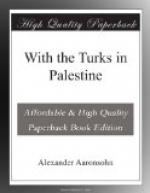Now, however, all was changed. The Arabs, who take defeat badly, turned against the authorities who had got them into such trouble. Rumors circulated that Djemal Pasha had been bought by the English and that the defeat at Suez had been planned by him, and persons keeping an ear close to the ground began to hear mutterings of a general massacre of Germans. In fact, things came within an ace of a bloody outbreak. I knew some Germans in Jaffa and Haifa who firmly believed that it was all over with them. In the defeated army itself the Turkish officers gave vent to their hatred of the Germans. Three German officers were shot by their Turkish comrades during the retreat, and a fourth committed suicide. However, Djemal Pasha succeeded in keeping order by means of stern repressive methods and by the fear roused by his large body-guard of faithful Anatolians.
[ILLUSTRATION: RAILROAD STATION SCENE BETWEEN HAIFA AND DAMASCUS/CAMELS BRINGING IN NEWLY CUT TREES, DAMASCUS]
We felt sure that the Turkish defeat would put a damper on the arrogance of the soldiery. But even the Mohammedan population were hoping that the Allies would push their victory and land troops in Syria and Palestine; for though they hated the infidel, they loved the Turk not at all, and the country was exhausted and the blockade of the Mediterranean by the Allies prevented the import and export of articles. The oranges were rotting on the trees because the annual Liverpool market was closed to Palestine, and other crops were in similar case. The country was short, too, of petroleum, sugar, rice, and other supplies, and even of matches. We had to go back to old customs and use flint and steel for fire, and we seldom used our lamps. Money was scarce, too, and, Turkey having declared a moratorium, cash was often unobtainable even by those who had money in the banks, and much distress ensued.
As the defeated army was pouring in from the south, I decided to leave Beersheba and go home. The roads and the fields were covered with dead camels and horses and mules. Hundreds of soldiers were straggling in disorder, many of them on leave but many deserting. Soon after the defeat at the Canal several thousand soldiers deserted, but an amnesty was declared and they returned to their regiments.
When I arrived at Jerusalem I found the city filled with soldiers. Djemal Pasha had just returned from the desert, and his quarters were guarded by a battery of two field guns. Nobody knew what to expect; some thought that the country would have a little more freedom now that the soldiery had lost its braggadocio, while others expected the lawlessness that attends disorganization. I went to see Consul Glazebrook. He is a true American, a Southerner, formerly a professor of theology at Princeton. He was most earnest and devoted in behalf of the American citizens that came under his care, rendering at Jerusalem the same sort of service that Ambassador Morgenthau




